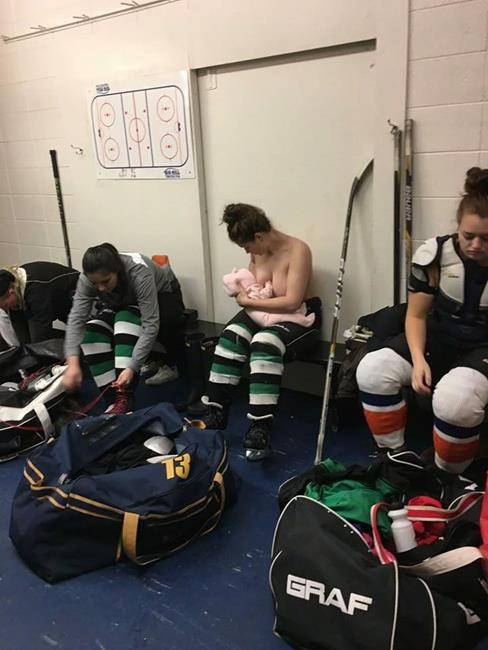A photo of a hockey player breastfeeding her baby between periods has riled social media, and that uproar has some lactation experts bemoaning how such a natural act continues to be sexualized and shamed.
Dr. Dan Flanders of Kindercare Pediatrics in Toronto called negative reaction to the photo ”so incredibly disappointing.”
“In a world that supports women and moms it should be a complete non-issue,” Flanders said Thursday.
“It should be like shopping at the supermarket. It should be like driving in your car to work, it should have no emotional impact but it obviously unveils a lot of hangups that we have in our society now. I guess breasts are very sexualized in our world and people have hangups about sex and sexuality.”
The Facebook photo of Serah Small breastfeeding her eight-week-old in an arena change room had drawn more than 1,000 likes and 500 shares by Thursday morning. In the photo, shared Monday by Milky Way Lactation Services, the Alberta mom is topless but still in her bulky hockey pants and skates.
The image and associated media stories have drawn strong online reaction, the vast majority of it appearing to be supportive, although some comments were not.
“Why do we have to keep going through this every few months,” one reader posts. “I don’t care where they feed their child as long as it’s not in a fine restaurant. Most of these women are just attention seekers anyways.”
Flanders says this kind of public shaming can make a difficult situation worse for some new moms, who are already at risk of feeling sad and isolated. He adds that it’s very common to feel uncomfortable breastfeeding in public, partly because of public shaming and a lack of resources to support moms who struggle.
“If we lived in an environment that wasn’t quite so — dare I say — misogynistic and uninterested in supporting new moms, I think they might find it a little bit less challenging to succeed at breastfeeding.”
Stigma reaches far and wide, adds author and lactation expert Jack Newman, who says he, too, gets negative comments online — often from other women who negatively view breastfeeding in public.
“I’ve even had mothers tell me that they were afraid of breastfeeding in front of their own parents. Or the parents-in-law have said, ‘No, you can’t do that here you have to go into the bedroom, not in front of us,” says Newman, pediatrician and founder of the Newman Breastfeeding Clinic in north Toronto.
Then there is the lack of adequate information from obstetricians, who could do much more to educate new moms and head off potential breastfeeding problems as part of prenatal care, he says.
“A lot of OB’s also don’t talk about breastfeeding but they give the mothers a little party pack of (baby) formula,” says Newman.
Margaret Salopek, a clinical nurse educator and lactation consultant at the Grey Nuns Community Hospital in Edmonton, says she’d like to see the working world do more to welcome nursing moms, a move that would go a long way towards quashing lingering stigma.
“We should be looking at ways to accommodate that, like providing the same kind of space you would provide to anybody who’s going to eat their lunch. It shouldn’t be a woman having to go and hide out in a toilet with her breast pump,” says Salopek.
New moms-to-be could also benefit from a more candid conversation with caregivers about how difficult it can be to breastfeed, she adds.
“I’m surprised that they haven’t been given as real a picture as they could be,” she says of some of the women she advises.
Flanders says the media also has a “huge” role to play, blaming it for giving voice “to the radicals on both sides of this conversation … to create as much tumult as they can to sell newspapers.”
He applauded the photo for doing its part to challenge ideas about nursing moms.
“I would imagine that the vast majority of us have never imagined a hockey player breastfeeding their child during intermission.”
The Canadian Press



